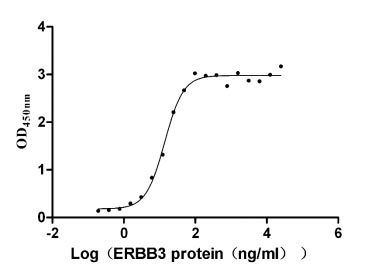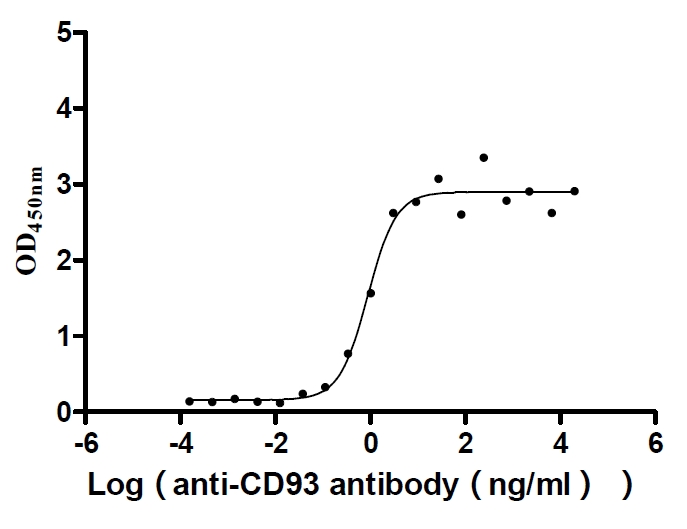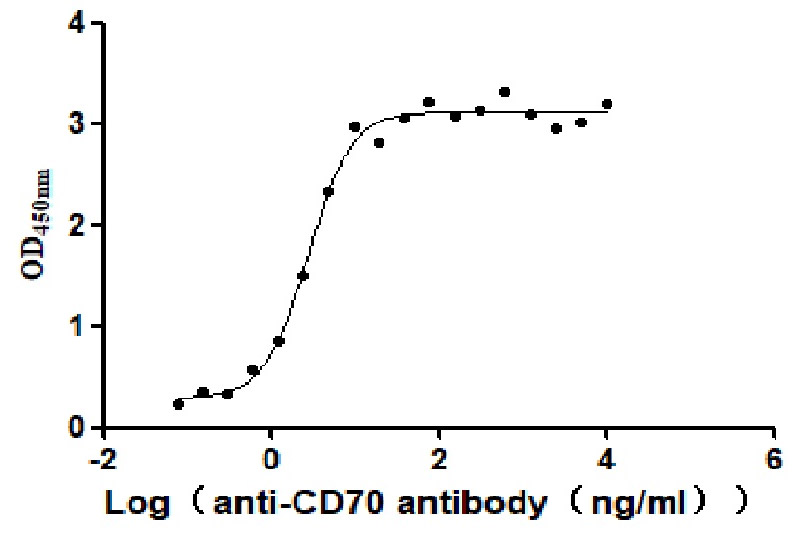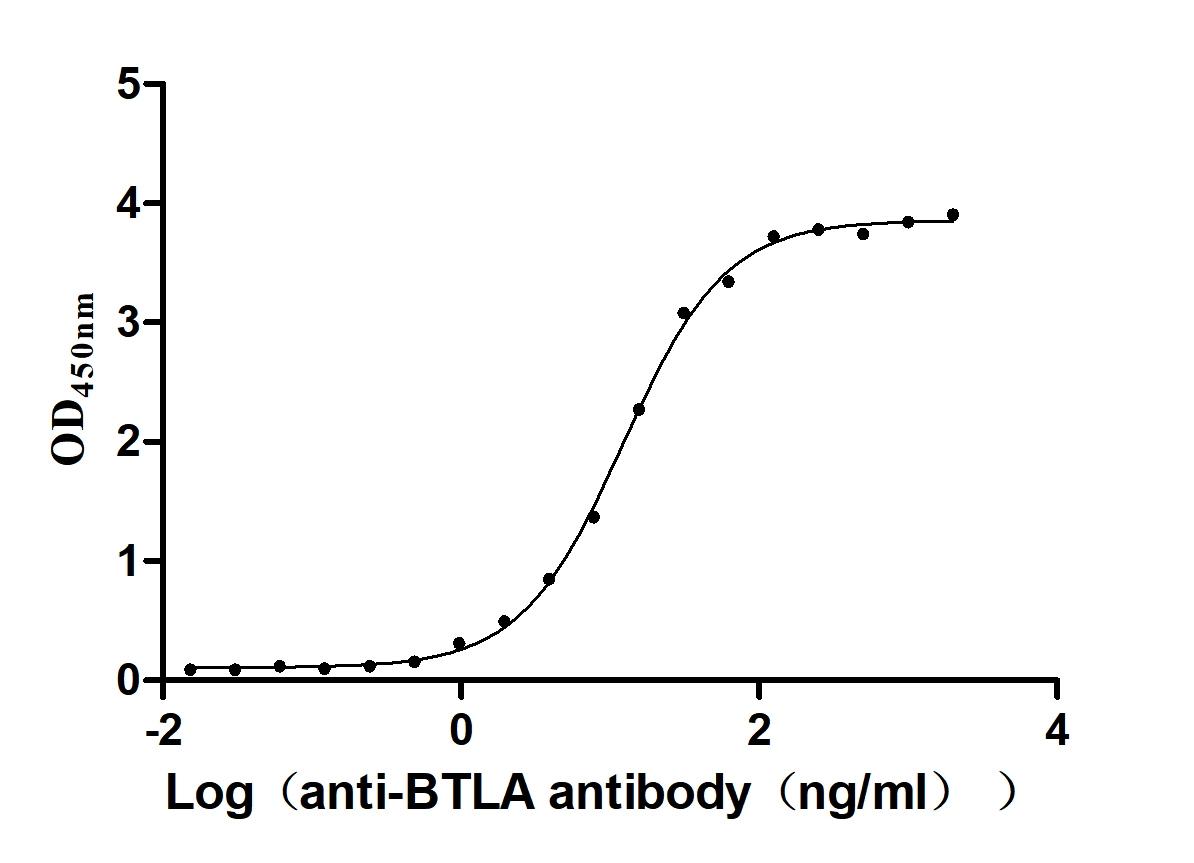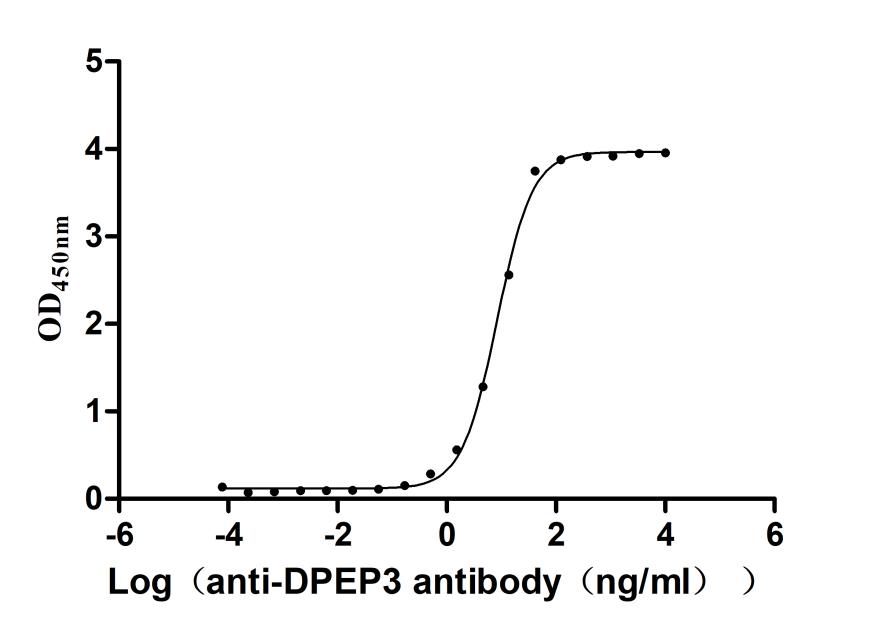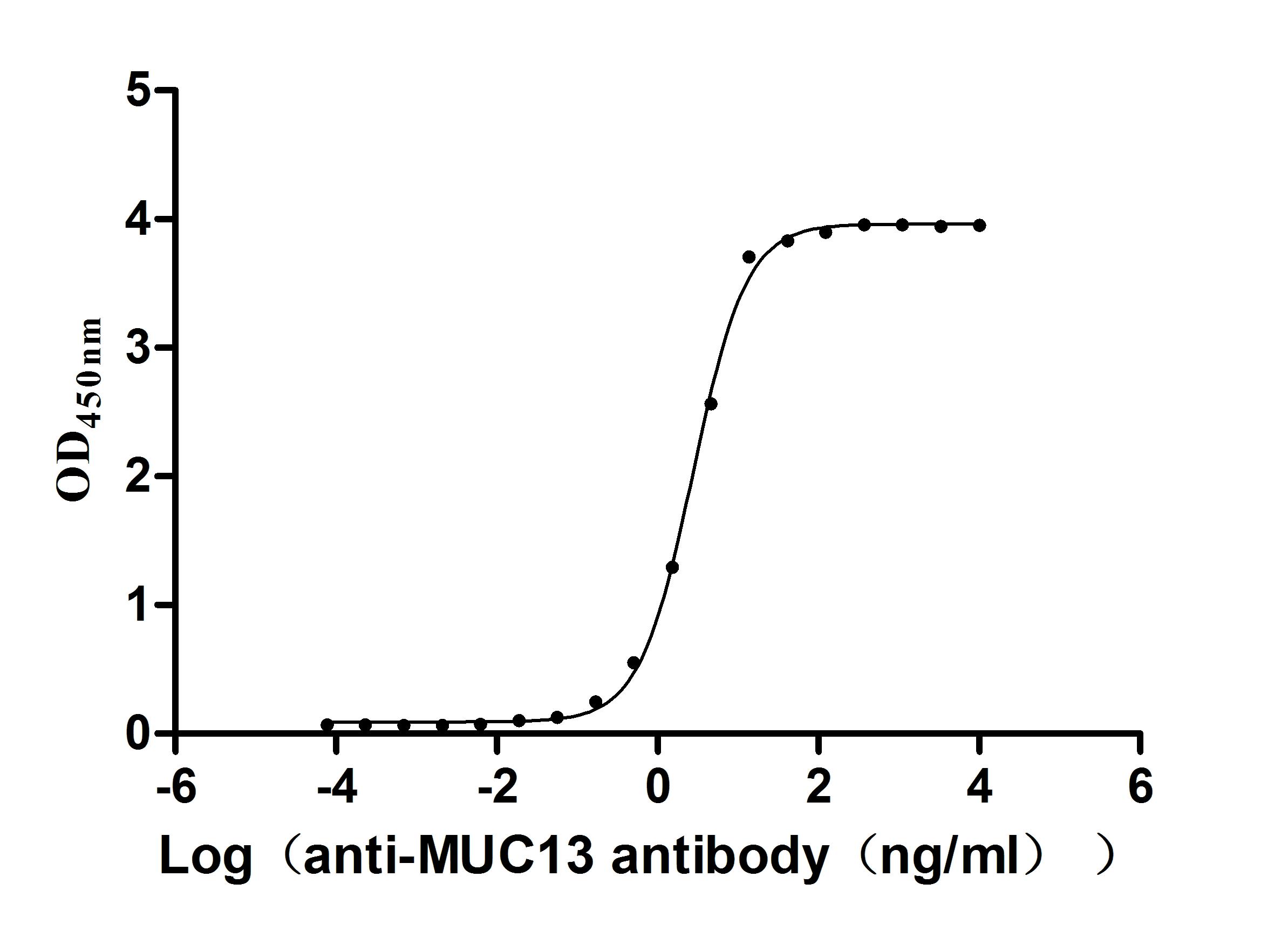Recombinant Mouse Autophagy-related protein 16-1 (Atg16l1)
-
货号:CSB-YP806473MO
-
规格:
-
来源:Yeast
-
其他:
-
货号:CSB-EP806473MO
-
规格:
-
来源:E.coli
-
其他:
-
货号:CSB-EP806473MO-B
-
规格:
-
来源:E.coli
-
共轭:Avi-tag Biotinylated
E. coli biotin ligase (BirA) is highly specific in covalently attaching biotin to the 15 amino acid AviTag peptide. This recombinant protein was biotinylated in vivo by AviTag-BirA technology, which method is BriA catalyzes amide linkage between the biotin and the specific lysine of the AviTag.
-
其他:
-
货号:CSB-BP806473MO
-
规格:
-
来源:Baculovirus
-
其他:
-
货号:CSB-MP806473MO
-
规格:
-
来源:Mammalian cell
-
其他:
产品详情
-
纯度:>85% (SDS-PAGE)
-
基因名:
-
Uniprot No.:
-
别名:Atg16l1; Apg16lAutophagy-related protein 16-1; APG16-like 1
-
种属:Mus musculus (Mouse)
-
蛋白长度:full length protein
-
表达区域:1-607
-
氨基酸序列MSSGLRAADF PRWKRHIAEE LRRRDRLQRQ AFEEIILQYT KLLEKSDLHS VLTQKLQAEK HDMPNRHEIS PGHDGAWNDS QLQEMAQLRI KHQEELTELH KKRGELAQLV IDLNNQMQQK DKEIQMNEAK ISEYLQTISD LETNCLDLRT KLQDLEVANQ TLKDEYDALQ ITFTALEEKL RKTTEENQEL VTRWMAEKAQ EANRLNAENE KDSRRRQARL QKELAEAAKE PLPVEQDDDI EVIVDETSDH TEETSPVRAV SRAATKRLSQ PAGGLLDSIT NIFGRRSVSS IPVPQDIMDT HPASGKDVRV PTTASYVFDA HDGEVNAVQF SPGSRLLATG GMDRRVKLWE AFGDKCEFKG SLSGSNAGIT SIEFDSAGAY LLAASNDFAS RIWTVDDYRL RHTLTGHSGK VLSAKFLLDN ARIVSGSHDR TLKLWDLRSK VCIKTVFAGS SCNDIVCTEQ CVMSGHFDKK IRFWDIRSES VVREMELLGK ITALDLNPER TELLSCSRDD LLKVIDLRTN AVKQTFSAPG FKCGSDWTRV VFSPDGSYVA AGSAEGSLYV WSVLTGKVEK VLSKQHSSSI NAVAWAPSGL HVVSVDKGSR AVLWAQP
-
蛋白标签:Tag type will be determined during the manufacturing process.
The tag type will be determined during production process. If you have specified tag type, please tell us and we will develop the specified tag preferentially. -
产品提供形式:Lyophilized powder
Note: We will preferentially ship the format that we have in stock, however, if you have any special requirement for the format, please remark your requirement when placing the order, we will prepare according to your demand. -
复溶:We recommend that this vial be briefly centrifuged prior to opening to bring the contents to the bottom. Please reconstitute protein in deionized sterile water to a concentration of 0.1-1.0 mg/mL.We recommend to add 5-50% of glycerol (final concentration) and aliquot for long-term storage at -20℃/-80℃. Our default final concentration of glycerol is 50%. Customers could use it as reference.
-
储存条件:Store at -20°C/-80°C upon receipt, aliquoting is necessary for mutiple use. Avoid repeated freeze-thaw cycles.
-
保质期:The shelf life is related to many factors, storage state, buffer ingredients, storage temperature and the stability of the protein itself.
Generally, the shelf life of liquid form is 6 months at -20°C/-80°C. The shelf life of lyophilized form is 12 months at -20°C/-80°C. -
货期:Delivery time may differ from different purchasing way or location, please kindly consult your local distributors for specific delivery time.Note: All of our proteins are default shipped with normal blue ice packs, if you request to ship with dry ice, please communicate with us in advance and extra fees will be charged.
-
注意事项:Repeated freezing and thawing is not recommended. Store working aliquots at 4°C for up to one week.
-
Datasheet :Please contact us to get it.
靶点详情
-
功能:Plays an essential role in autophagy: interacts with ATG12-ATG5 to mediate the conjugation of phosphatidylethanolamine (PE) to LC3 (MAP1LC3A, MAP1LC3B or MAP1LC3C), to produce a membrane-bound activated form of LC3 named LC3-II. Thereby, controls the elongation of the nascent autophagosomal membrane. Regulates mitochondrial antiviral signaling (MAVS)-dependent type I interferon (IFN-I) production. Negatively regulates NOD1- and NOD2-driven inflammatory cytokine response. Instead, promotes with NOD2 an autophagy-dependent antibacterial pathway. Plays a role in regulating morphology and function of Paneth cell.
-
基因功能参考文献:
- show that the WD repeat-containing C-terminal domain (WD40 CTD) of ATG16L1 is essential for LC3 recruitment to endolysosomal membranes during non-canonical autophagy PMID: 29317426
- T300A polymorphism alters the function of motif-containing molecules that engage ATG16L1 through the WD40 domain PMID: 27273576
- these results indicate impaired CD11c(+)DCs function with Atg16l1 deficiency contributes to the severity of murine colitis. PMID: 28390705
- These findings indicate that, in contrast to tumor cells in which autophagy promotes caspase-independent cell death, ATG16L1 maintains the intestinal barrier by inhibiting necroptosis in the epithelium. PMID: 29089374
- transient expression of ATG16L1 not only inhibited autophagosome biogenesis, but also aberrantly targeted RAB11-positive recycling endosomes, resulting in recycling endosome aggregates. PMID: 27875067
- this study shows that loss of Atg16l1 in myeloid cells exacerbated murine models of colitis PMID: 28130498
- this study shows that the inflammatory bowel disease-associated autophagy gene Atg16L1T300A acts as a dominant negative variant in mice PMID: 28202618
- both TNF-R and nucleotide-binding oligomerization domain stimulation promote ATG16L1 stabilization via IKKalpha-dependent phosphorylation of ATG16L1 at Ser278. PMID: 28082356
- defective autophagy in intestinal epithelial cells (IECs) may predispose to crohn disease ileitis via impaired clearance of IRE1alpha aggregates during ER stress at this site. PMID: 28082357
- Selective deletion of Atg16l1 in T cells in mice resulted in spontaneous intestinal inflammation that was characterized by aberrant type 2 responses to dietary and microbiota antigens, and by a loss of Foxp3(+) Treg cells. PMID: 26910010
- Arg-24 of Atg16L1 is crucial for its interaction with Atg5 which has implications in the binding of the dimeric complex to Rab33B PMID: 26975471
- inhibition of IL-1beta signaling abrogates the ATG16L1-dependent protection from Urinary tract infections PMID: 25669147
- A hypomorphic mutation in Atg16L1, a crucial autophagy gene, leads to developmental retention of early-stage cells in various tissues where the differentiation of stem cells is retarded. PMID: 26837467
- findings suggest that the regulatory axis of HIF-1alpha-miRNA-20a-Atg16l1 might be a critical mechanism for hypoxia-induced osteoclast differentiation PMID: 25485521
- Atg16L1 deficiency leads to an exacerbated graft-versus-host disease in a mouse model of allogeneic hematopoietic stem cell transplantation. PMID: 25308334
- nucleotide-binding oligomerization domain containing 2 deficiency did not reverse the ATG16L1-deficiency-induced protection from urinary tract infections PMID: 24384785
- Atg16L1 T300A variant decreases selective autophagy resulting in altered cytokine signaling and decreased antibacterial defense. PMID: 24821797
- An Atg16L1 deficiency alters the intestinal environment to mediate an enhanced immune response that is dependent on monocytic cells. PMID: 23954160
- Atg16l1 is required for autophagy in intestinal epithelial cells and protection of mice from Salmonella infection. PMID: 23973919
- ATG16L1 expression enhanced Nod-driven cytokine production. ATG16L1 interfered with poly-ubiquitination of Rip2 adaptor & its recruitment into large signaling complexes. It also regulates bacterial-infected intestinal epithelial cells. PMID: 24238340
- Atg16L1 directly interacts with Fip200. PMID: 23392225
- Atg5-Atg12/Atg16L1 protein complex is required for IFNgamma-mediated host defense against murine norovirus infection. PMID: 22520467
- Atg16L1 deficiency confers protection in vivo to the host against both acute and latent uropathic Escherichia coli infection. PMID: 22715292
- Study demonstrates that an interaction between a specific virus infection and a mutation in the Crohn's disease susceptibility gene Atg16L1 induces intestinal pathologies in mice. PMID: 20602997
- Results link bacterial sensing by Nod proteins to the induction of autophagy and provide a functional link between Nod2 and ATG16L1 PMID: 19898471
- In conjunction with Apg12-Apg5, Apg16L associates with the autophagic isolation membrane for the duration of autophagosome formation. PMID: 12665549
- Atg16L complex is a new type of E3-like enzyme that functions as a scaffold for LC3 lipidation by dynamically localizing to the putative source membranes for autophagosome formation. PMID: 18321988
- Rab33 modulates autophagosome formation through interaction with Atg16L PMID: 18448665
- Atg16L1 is an essential component of the autophagic machinery responsible for control of the endotoxin-induced inflammatory immune response PMID: 18849965
- ATG16L1 deficient Paneth cells exhibited notable abnormalities in the granule exocytosis pathway PMID: 18849966
- role in intestinal inflammatory disease, knockout model PMID: 19269148
- Atg16L1 T300A is differentially involved in Crohn disease and canonical autophagy PMID: 19783656
显示更多
收起更多
-
亚细胞定位:Cytoplasm. Preautophagosomal structure membrane; Peripheral membrane protein.
-
蛋白家族:WD repeat ATG16 family
-
组织特异性:Widely expressed. Isoform 1: Expressed in liver. Isoform 2: Highly expressed in liver. Isoform 3: Expressed in brain.
-
数据库链接:
KEGG: mmu:77040
STRING: 10090.ENSMUSP00000108815
UniGene: Mm.272972
Most popular with customers
-
Recombinant Human Receptor tyrosine-protein kinase erbB-3 (ERBB3), partial (Active)
Express system: Mammalian cell
Species: Homo sapiens (Human)
-
Recombinant Human Complement component C1q receptor (CD93), partial (Active)
Express system: Mammalian cell
Species: Homo sapiens (Human)
-
Recombinant Human CD70 antigen (CD70), partial (Active)
Express system: Mammalian cell
Species: Homo sapiens (Human)
-
Recombinant Human B- and T-lymphocyte attenuator(BTLA), partial (Active)
Express system: Mammalian cell
Species: Homo sapiens (Human)
-
Recombinant Macaca fascicularis Dipeptidase 3(DPEP3) (Active)
Express system: Mammalian cell
Species: Macaca fascicularis (Crab-eating macaque) (Cynomolgus monkey)
-
Recombinant Human Mucin-13(MUC13),partial (Active)
Express system: yeast
Species: Homo sapiens (Human)


